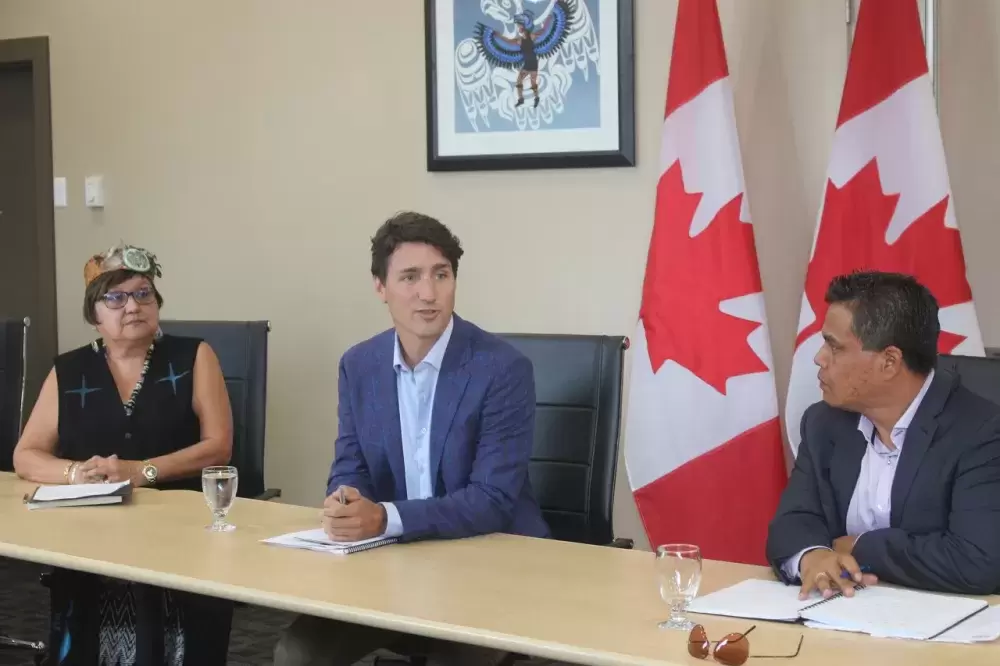Although the NDP dominated Vancouver Island in 2015 – including winning by large margins in Nuu-chah-nulth communities – a tight race with the Conservatives is unfolding with less than a month left in the federal election campaign.
Four years ago the Conservative Party of Canada lost all of its seats on Vancouver Island, as the NDP took six while Green Party Leader Elizabeth May retained her longstanding hold on the Saanich-Gulf Islands constituency. Since then the Greens took another seat in May when Paul Manly won a byelection in Nanaimo.
NDP support was particularly strong in communities with high concentrations of Nuu-chah-nulth people. Results from the 2015 election show 87 per cent support for NDP Candidate Gord Johns on Flores Island, which includes the community of Ahousaht. Kyuquot saw 77 per cent of its voters support NDP candidate Rachel Blaney - a 78-per-cent voter turnout – while 98.4 per cent of the Mowachaht/Muchalaht reserve of Tsaxana voted for Blaney. In Ditidaht territory, 71 per cent of voters around the Nitinaht Lake supported Alistair MacGregor as their NDP candidate.
But the Conservatives could gain ground on Oct. 21, according to regional polls based on a statistical model of election projections. 338 Canada weighs opinion polls, the electoral history of Canadian provinces and demographic data. As of Sept. 22, the model illustrates the Conservatives slightly ahead of the NDP in North Island-Powell River at 29.6 to 26.8 per cent, with the Greens at 23.6 per cent and the Liberals earning 16.9 per cent of votes in the riding.
The model estimates an even closer race in Cowichan-Malaht-Lanford, with the Conservatives at 27.1 per cent to the NDP’s 26.4, while the Green’s have 24.3 and the Liberal’s have 19.4 per cent cent of the vote.
Courtenay-Alberni, the third riding that covers Nuu-chah-nulth territory on the west coast of Vancouver Island, has the Conservatives at 31.5 per cent, while the incumbent NDP has 26.7, to the Green’s 22 per cent and the Liberal’s 16.7 per cent of the vote. The 338 Canada model has not been tested before in a federal election, but its creator, P.J. Fournier, cites accurate predictions for most ridings in provincial elections last year.
Meanwhile, a national Nanos poll of 1,200 Canadians released Sept. 23 shows the Conservatives with a slight lead on Justin Trudeau’s Liberals, with 34 to 33 per cent of the vote. The NDP have 13 per cent, while the Green Party holds 11, according to the Nanos poll, with the Bloc Quebecois at 6 per cent and the new People’s Party of Canada predicted to earn 3 per cent of Canadians’ support on Oct. 21.
Possibly more than any other prime minster, over the last term Trudeau raised expectations for the federal government’s dealings with First Nations.
“No relationship is more important to Canada than the relationship with Indigenous Peoples,” said Trudeau in his National Aboriginal Day statement on June 21, 2017. “Our government is working together with Indigenous Peoples to build a nation-to-nation, Inuit-Crown, government-to-government relationship – one based on respect, partnership, and recognition of rights.”
But in 2019, the federal government’s recognition of Nuu-chah-nulth rights remains unresolved, says Judith Sayers, president of the Nuu-chah-nulth Tribal Council. This is illustrated by an ongoing court battle with Ottawa over the scope that five nations can harvest and sell fish from their territories, she said.
“Nuu-chah-nulth have a lot of knowledge to work with fisheries, to help resolve some of these issues, and we’ve never ever had that kind of cooperation from DFO,” said Sayers. “They barely consult with us properly.”
Following a Fisheries and Oceans Canada report this summer that highlights the effects of global warming on wild salmon, Sayers stressed the need for Canada to better protect the ocean resources Nuu-chah-nulth people rely upon.
“The oceans are warming quickly, especially from the north of Vancouver Island all the way down, which is all Nuu-chah-nulth territory,” she said. “We need to have the government not approving projects that create more greenhouse gases and warm the waters. We need to have actions taken to mitigate those warming waters.”
“Growing economy and jobs is important, but not at the risk of the environment, especially now when we’re at such critical junctures in the heating up of the earth and our waters,” stressed Sayers. “We need to take a different look at how we can make money.”
On the day before the NTC’s annual general meeting in Victoria, a forum was scheduled on Sept. 24 to collect input from Nuu-chah-nulth-aht for a mandate to start negotiations with the next government in Ottawa following the Oct. 21 vote.
“A lot of people feel like we’re not Canadians, we’re not part of the government and we’re not going to vote,” said Sayers. “Other people feel like they do really need to vote. But I think they need to look at the candidate of their choice and decide who is it that you believe in – that’s going to work for you, that’s going to do things for you.”

